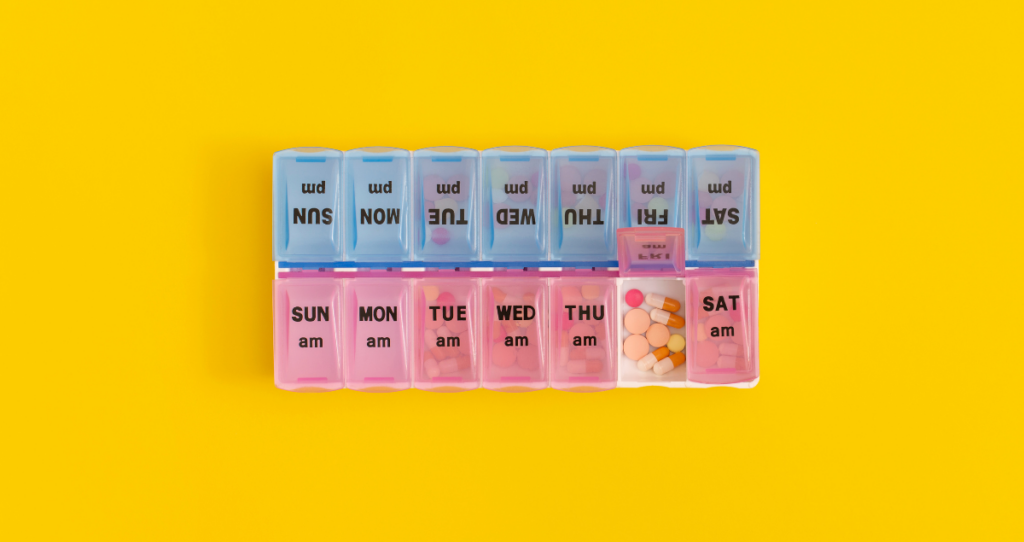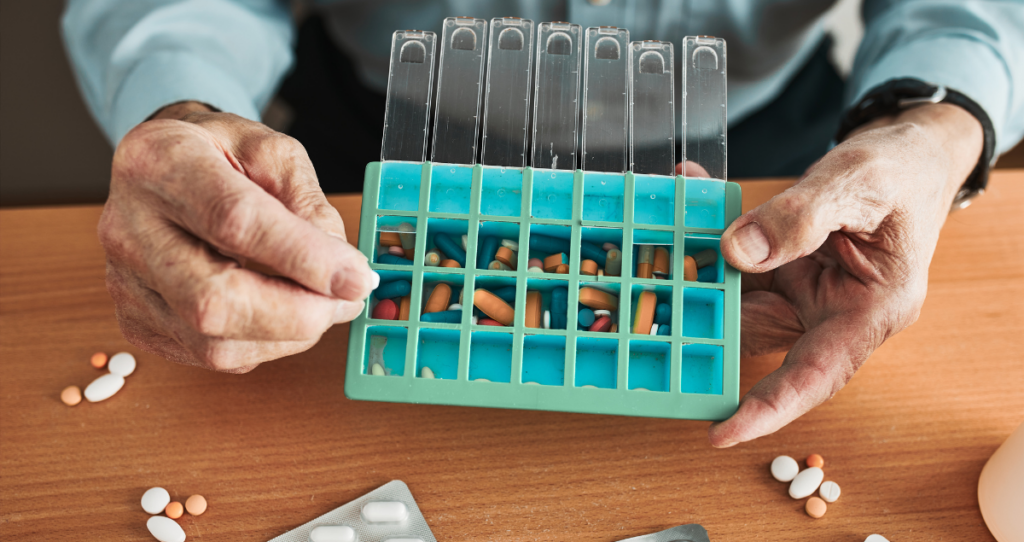Managing multiple prescriptions at the same time can be challenging. It’s vitally important, however, to take the right doses, as prescribed, at the right time. Even if you are only taking one prescription, medication safety can be a matter of life and death. Here are a few simple tips to help you manage your medications and protect your health.
Remembering Doses
There are a variety of methods to remember medication doses. Some people place rubber bands on their wrists as a reminder; others record their doses on a calendar after they take them. Another option is a simple medication box with compartments for several times each day, for every day of the week. The patient or a caretaker fills the box once a week, placing the appropriate meds in the appropriate compartments. Using this type of storage container can help you remember whether you’ve already taken a dose or not.
If you want to take the reminder a step further, you can also get what’s called an alarm med box. It is like the box mentioned above, except that it comes with an alarm that can be set for the appropriate times, and the alarm sounds as a reminder to take the meds. For those dealing with more severe memory issues, there are also more sophisticated models that will only open the appropriate compartment when the alarm sounds.

Know Your Medications
Contrary to the popular saying, what you don’t know can hurt you. The more you know about the medications you are taking, the more comfortable you will be using them properly. Don’t be afraid to ask your physician or pharmacist questions. For each medication you are taking, whether it’s a prescription medication or an over-the-counter drug or supplement, have a chart with this information to be sure you understand what the medication does and how it should be used:
- Medication name (both brand and generic)
- Size, color, and imprint on the pill
- Dosage
- Common side effects
- What to do for side effects
- When to call the doctor
- Other special instructions
If you notice a change in shape, color or size of the tablet or capsule when refilling a prescription, consult the pharmacist. The pharmacist may simply be changing the brand of drug to get the best price. Sometimes, however, mistakes do happen. If you notice a change, ask about it!

Drug Dos and Don’ts
These drug DOs and DON’Ts can help you make sure that your medication will work as prescribed.
Do:
Take each medication exactly as it has been prescribed, including at the prescribed time. Blood levels of medication are very important. If doses are taken too close together instead of at the appropriate intervals, side effects increase. Too high/too low of a blood level can occur and absorption may be enhanced or delayed.
Make sure that all your doctors know about all your medications. It is very important to tell your doctor all the medications you are taking, and which doctors are helping with your care. This ensures that medications don’t overlap. Consultations with other doctors will be easier also.
Tell your doctors and pharmacist about any other over-the-counter medications, vitamins, supplements or herbs that you use. Over-the-counter medications and herbal remedies can cause adverse reactions or interactions with other medications. Make sure each member of your healthcare team knows what you take.
Use the same pharmacy to fill all your prescriptions. Pharmacies keep profiles on each patient. Tell your pharmacist all medical conditions you have and every medication you take. He or she can help you keep track of your current prescriptions and can alert you or your doctor of possible interactions.
Keep medications out of the reach of children. Adult formulations can kill children. Many medications are colorful and flavored, so children will look at them as candy-like products.
Read the handouts with each new prescription. Each new prescription has reading material with it. This is potentially lifesaving information and answers questions that may not have been asked at the doctor’s office.
Read the label 3 times. This keeps you from taking the wrong medication. It is important to identify which medications you are about to take or load into your medication box. Reading the label three times helps reduce errors and keeps you from overdosing.

Don’t:
DON’T change your medication dose or schedule without talking with your doctor. As a rule, don’t change or stop medication without talking with your doctor or pharmacist. Many drugs need to be tapered off, and serious side effects can be seen if medications are suddenly stopped. Sometimes medications need sufficient time to work. A month or longer often optimizes drug therapy. Stopping medications too soon can be worse than not taking them at all, especially with antibiotics. If antibiotics can’t reach MIC (minimal inhibitory concentrations) for a specified period, then the next generation of bacteria will be resistant. Resistant bacteria are often very difficult to treat.
DON’T use medication prescribed for someone else. What is safe and beneficial for one person may not be for another. You may have medical conditions or allergies that could make the medication harmful to you. Only your physician knows the proper medication for you.
DON’T crush or break pills unless your doctor instructs you to do so. This can change the rate of absorption in the body. Drugs are best absorbed if they are taken in the form the manufacturer made them. If medications are broken or crushed, it may cause a dumping effect, thus dropping blood pressure, etc.
DON’T use medication that is past its expiration date. Over time, medicines can break down, becoming less potent or even toxic. As moisture accumulates in the container, bacteria, mold, etc. can grow undetected on the surface of the expired medication.
DON’T store your medications in locations that are too hot, too cold or too damp. For example, the bathroom cabinet may not be the best place for your medication.
If you are the caretaker for an older adult, it’s even more important to know this information and help them manage their medications in a safe way.

Take Medication Safety Seriously: Your Life Could Depend on It
While medication can reduce discomfort, treat infections or even save your life, it can also be the most dangerous substance you bring into your home. Take medication safety seriously and be vigilant about managing your prescriptions to ensure you are taking the proper dosages.
Having a relationship with the right primary care physician and their team is a cornerstone of quality healthcare. ACV Health’s mission is to provide comprehensive care in a convenient and familiar environment. In addition to our offices, we are pleased to offer patients a convenient on-site pharmacy. After attending an appointment, a friendly pharmacist is available nearby to discuss medication safety and answer any questions you may have. Call 386-658-5860 to speak with a pharmacist today!
This article is provided for informational purposes only and should not be construed as specific medical, legal or financial advice. Please consult with your physician before making any changes to your medical care.




